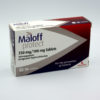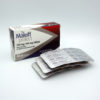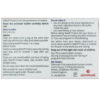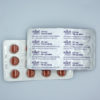



Key features of Maloff Protect
As of July the 1st 2021 the rules on VAT for EU sales will be changing. For orders less than £135 (€150) we will display the total price inclusive of the VAT rate. For orders above this amount, you will not be charged VAT and you will be required to pay this when your goods arrive in your country. Read more on the new rules here.
Travel Advice regarding Malaria
Introduction
Malaria is a parasite infection that is transmitted by the bite of female mosquitoes. The parasites are microscopic and exist in different forms within the mosquito and human; their life cycle is complex.
Symptoms usually include fever, shivering and sweating; muscle pains, headache and vomiting are common.
Infection can be severe and rapidly fatal if treatment is not started quickly. Treatment cures the infection when initiated properly and promptly.
You cannot be vaccinated against malaria, but you can protect yourself against this disease using the A, B, C, D approach to prevention as follows:
Awareness of risk
Malaria is widespread in many tropical and subtropical countries. Find out if there is a risk of malaria in the country you intend to visit by accessing country specific malaria information and malaria maps via the Destinations tab on the NHS FITFORTRAVEL web site. Note that the risk of malaria can vary between and within countries and depending on the time of year you are travelling.
Bite Prevention
Mosquito bite avoidance is essential; reducing the number of bites you receive reduces the chance of infection developing. Take practical measures to avoid mosquito bites:
Check whether you need to take malaria prevention tablets
If you do, make sure you take the right antimalarial tablets at the right dose, and finish the course.
Chemoprophylaxis (taking malaria prevention tablets)
For some countries with a high risk of malaria, tablets to prevent malaria (antimalarials) are recommended.
There are a range of different antimalarial tablets available, and these differ in their mode of action, how they are taken and their side effects. You are selecting Atovaquone/Proguanil hydrochloride 250 mg/100 mg film-coated tablets and it is important you read carefully the Patient Information Leaflet that comes with the medicine.
Diagnosis
Seek immediate medical advice if you have malaria symptoms, including up to a year after you return from travelling.
Symptoms of malaria can develop as quickly as 7 days after you’re bitten by an infected mosquito. Typically, the time between being infected and when symptoms start (incubation period) is 7 to 18 days, depending on the specific parasite you’re infected with. However, in some cases it can take up to a year for symptoms to develop.
The initial symptoms of malaria are flu-like and include:
These symptoms are often mild and can sometimes be difficult to identify as malaria.
With some types of malaria, the symptoms occur in 48-hour cycles. During these cycles, you feel cold at first with shivering. You then develop a high temperature, accompanied by severe sweating and fatigue. These symptoms usually last between 6 and 12 hours.
The most serious type of malaria is caused by the Plasmodium falciparum parasite. Without prompt treatment, this type could lead to you quickly developing severe and life-threatening complications, such as breathing problems and organ failure.
On our Malaria information page we you will be able to find out more information about the different types of malaria and the medications used to prevent and treat the illness.
Basic information for taking this medicine is to ….
Please make sure that you read the Patient Information Leaflet
How many tablets do I need?
Very simple – you need to take this medicine for 2 days before you travel and then for 7 days once you return to a malaria risk free area. If you are visiting several areas, we suggest you take the treatment throughout your trip until you return to a malaria risk free area for the long term. This simple chart indicates how many tablets you will need based on the number of days you will spend in malaria risk areas.
Please note that if you require more than 96 tablets (e.g. also buying for a partner) you should make a separate purchase as orders for more than 96 tablets could delay shipping.
Have you read the full product description?
We need you to read the full description shown below that includes the key parts of the Patient Information Leaflet where there is also a direct link to the latest version of the leaflet. The information includes who the medicine is for, when to take the medicine, how long for and much more. The Information leaflet also defines when to take the medicine to treat Malaria BUT this medicine should only be taken as a preventative treatment unless specifically instructed to take as a treatment by a Doctor or medical professional.
Did you visit the FITFORTRAVEL web-site?
This is a link to the NHS site called FITFORTRAVEL (Click Here). It is vital you visit this site to ensure you fully understand the precautions you need to take and to check if the areas you are visiting are Malarial risk areas. Additionally, there are many other diseases that can be contracted in many areas, so it is important to check if there are other medicines, vaccines or immunisations required to visit that area. As an example, it is advised that pregnant women or women that may be pregnant or planning a baby should not visit areas where the Zika virus may exist.
Do you have any medical conditions?
There are some known medical conditions that can cause complications, so we need to know if this applies for the person/s taking this medicine. If you answer “Yes” to this question, please send us a message by using the “send seller a message” option giving the full details. Our medical professional will check to see if issuing the treatment is still ok. We have shown below the full latest list of medical conditions and contra indication medicines. You should read this section carefully before proceeding to buy this medicine. As an example, if you are pregnant, we cannot issue the medicine to you and you should discuss what to do with your GP.
Do you weigh at least 40kg?
This medicine is not suitable for anyone weighing less than 40kg and in these cases you should discuss alternative treatments with your doctor.
Atovaquone/Proguanil hydrochloride 250 mg/100 mg film-coated tablets
Instructions for Use
Read all of the Patient Information Leaflet carefully before you start taking this medicine because it contains important information for you.
What is in this leaflet:
What Atovaquone/Proguanil hydrochloride is and what it is used for.
Atovaquone/Proguanil hydrochloride belongs to a group of medicines called antimalarials. It contains two active substances, atovaquone and proguanil hydrochloride. Atovaquone/Proguanil hydrochloride is used to:
Malaria is spread by the bite of an infected mosquito, which passes the malaria parasite (Plasmodium falciparum) into the bloodstream. Atovaquone/Proguanil hydrochloride prevents malaria by killing this parasite. For people who are already infected with malaria, Atovaquone/Proguanil hydrochloride also kills these parasites.
Protecting yourself from catching malaria
People of any age can get malaria. It is a serious disease but is preventable. As well as taking Atovaquone/Proguanil hydrochloride, it is very important that you also take steps to avoid being bitten by mosquitoes:
If you need further advice, talk to your doctor or pharmacist.
It is still possible to get malaria after taking the necessary precautions. Some types of malaria infection take a long time to cause symptoms, so the illness may not start until several days, weeks or even months after returning from abroad. See a doctor immediately if you get symptoms such as high temperature, headache, shivering and tiredness after returning home.
What you need to know before you take Atovaquone/Proguanil hydrochloride
Do not take Atovaquone/Proguanil hydrochloride:
Tell your doctor if either of these applies to you.
Warnings and precautions
Talk to your doctor or pharmacist before taking Atovaquone/Proguanil hydrochloride.
Children
Atovaquone/Proguanil hydrochloride 250 mg/100 mg film-coated tablets are not recommended in children who weigh less than 11 kg. Another strength of atovaquone/ proguanil tablets may be available which are more suitable for children who weigh less than 11 kg.
Other medicines and Atovaquone/Proguanil hydrochloride
Tell your doctor or pharmacist if you are taking or have recently taken or might take any other medicines. Some medicines can affect the way Atovaquone/Proguanil hydrochloride works, or Atovaquone/Proguanil hydrochloride itself can strengthen or weaken the effectiveness of other medicines taken at the same time. These include:
Tell your doctor if you are taking any of these. Your doctor may decide that Atovaquone/Proguanil hydrochloride is not suitable for you, or that you need extra check-ups while you are taking it.
Remember to tell your doctor if you start taking any other medicines while you are taking Atovaquone/Proguanil hydrochloride.
Pregnancy and breast-feeding
If you are pregnant or breast-feeding, think you may be pregnant or are planning to have a baby, ask your doctor or pharmacist for advice before taking this medicine. Atovaquone/Proguanil hydrochloride should not be used during pregnancy unless your doctor recommends it.
You should not breast-feed while taking Atovaquone/Proguanil hydrochloride, as the ingredients of Atovaquone/Proguanil hydrochloride may pass into breast milk and may harm your baby.
Driving and using machines
If you feel dizzy, do not drive. Atovaquone/Proguanil hydrochloride makes some people feel dizzy. If this happens to you, do not drive, use machines or take part in activities where you may put yourself or others at risk.
Atovaquone/Proguanil hydrochloride contains lactose. If you have been told by your doctor that you have an intolerance to some sugars, contact your doctor before taking this medicinal product.
If you feel dizzy, do not drive. Atovaquone/Proguanil hydrochloride makes some people feel dizzy. If this happens to you, do not drive, use machines or take part in activities where you may put yourself or others at risk.
Atovaquone/Proguanil hydrochloride contains lactose. If you have been told by your doctor that you have an intolerance to some sugars, contact your doctor before taking this medicinal product.
How to take Atovaquone/Proguanil hydrochloride
Always take this medicine exactly as your doctor or pharmacist has told you. Check with your doctor or pharmacist if you are not sure.
To prevent malaria:
The recommended dose for adults and children weighing at least 40 kg is 1 tablet once a day, taken as below. Atovaquone/Proguanil hydrochloride is not recommended for preventing malaria in children, or in adults or adolescents who weigh less than 40 kg. There may be different types of tablets available in your country for preventing malaria in children and adults who weigh less than 40 kg.
To treat malaria:
The recommended dose for adults is 4 tablets once a day for 3 days.
For children weighing 11 kg or more the dose depends on their bodyweight:
Not recommended for treating malaria in children who weigh less than 11 kg. For children who weigh less than 11 kg talk to your doctor.
There may be different type of tablets available in your country for children, containing less atovaquone and proguanil hydrochloride.
Method of administration
For oral use. Take Atovaquone/Proguanil hydrochloride with food or a milky drink, where possible.
Take Atovaquone/Proguanil hydrochloride at the same time each day.
If you are sick (vomit):
For preventing malaria:
Atovaquone/Proguanil hydrochloride may not be as effective, as the amount absorbed will be reduced.
If you are sick (vomit):
For treating malaria:
If you take more Atovaquone/Proguanil hydrochloride than you should contact a doctor or pharmacist for advice. If possible show them the Atovaquone/Proguanil hydrochloride pack.
If you forget to take Atovaquone/Proguanil hydrochloride.
It is very important that you take the full course of Atovaquone/Proguanil hydrochloride.
Warnings and precautions
Talk to your doctor or pharmacist before taking Atovaquone/Proguanil hydrochloride.
Children
Atovaquone/Proguanil hydrochloride 250 mg/100 mg film-coated tablets are not recommended in children who weigh less than 11 kg. Another strength of atovaquone/ proguanil tablets may be available which are more suitable for children who weigh less than 11 kg.
Other medicines and Atovaquone/Proguanil hydrochloride
Tell your doctor or pharmacist if you are taking or have recently taken or might take any other medicines. Some medicines can affect the way Atovaquone/Proguanil hydrochloride works, or Atovaquone/Proguanil hydrochloride itself can strengthen or weaken the effectiveness of other medicines taken at the same time. These include:
Tell your doctor if you are taking any of these. Your doctor may decide that Atovaquone/Proguanil hydrochloride is not suitable for you, or that you need extra check-ups while you are taking it.
Remember to tell your doctor if you start taking any other medicines while you are taking Atovaquone/Proguanil hydrochloride.
Pregnancy and breast-feeding
If you are pregnant or breast-feeding, think you may be pregnant or are planning to have a baby, ask your doctor or pharmacist for advice before taking this medicine. Atovaquone/Proguanil hydrochloride should not be used during pregnancy unless your doctor recommends it.
You should not breast-feed while taking Atovaquone/Proguanil hydrochloride, as the ingredients of Atovaquone/Proguanil hydrochloride may pass into breast milk and may harm your baby.
Driving and using machines
If you feel dizzy, do not drive. Atovaquone/Proguanil hydrochloride makes some people feel dizzy. If this happens to you, do not drive, use machines or take part in activities where you may put yourself or others at risk.
Atovaquone/Proguanil hydrochloride contains lactose. If you have been told by your doctor that you have an intolerance to some sugars, contact your doctor before taking this medicinal product.
How to Store Maloff Protect
Reporting of side effects
If you get any side effects, talk to your doctor, pharmacist or nurse. This includes any possible side effects not listed in the Patient Information leaflet. You can also report side effects directly via the Yellow Card Scheme at:
By reporting side effects you can help provide more information on the safety of this product.
Other Information
If you need more advice consult your doctor or pharmacist.
Keep all medicines out of the sight and reach of children.
News page September 2017 ‘Super Malaria’ Scientists are becoming very concerned about a “super malaria” parasite which is spreading through South East Asia at an alarming rate. The parasite, spread by mosquitoes cannot be killed with any of the current anti-malaria drugs. The strain was first found in Cambodia back in 2007 but has now […]
Malaria is a serious and potentially life-threatening disease of the blood, approximately a million-people die from it every year. In Africa, a child dies every 30 seconds from malaria. Fortunately, malaria is preventable and can be treated. The symptoms of malaria typically start 1-4 weeks after being infected. What causes Malaria? Malaria is caused by a […]
You must be logged in to post a review.
Reviews
There are no reviews yet.